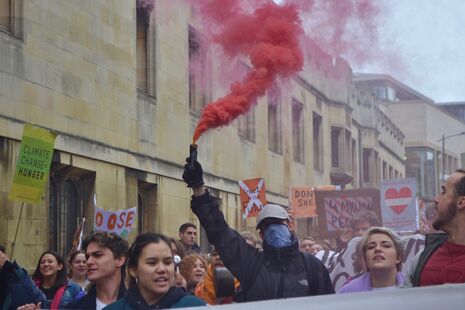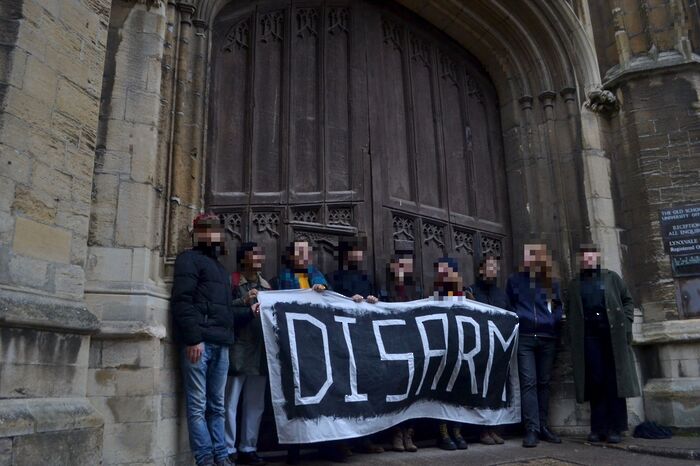Emmanuel to integrate Paris Accord principles in investment portfolio
The college declined to comment as to whether the decision will result in the exclusion of investments in Royal Dutch Shell or Colgate Palmolive, in which the college holds £1.6m and £1.3m respectively

Emmanuel College’s governing body has amended its investment strategy to fall in line with the principles set out in the 2015 Paris Accord on climate change, the college bursar has told students in an email sent this afternoon.
The college is now set to exclude certain companies from its holdings, while the investment manager will “engage with other companies to promote their long-term sustainability”.
Emmanuel Bursar Mike Gross claimed that the policy will “not be engagement with no end date”, adding that “companies within the College’s portfolio will need to be taking real and practical steps now to adopt strategies that are compatible with the economy’s transition to being carbon net zero by [2050]”.
Got a story for us?
Seen something you think Varsity should be talking about? Contact our News team at news@varsity.co.uk.
An investigation by student newspapers Varsity and Cherwell earlier this month found Emmanuel to be one of the known Cambridge colleges with the highest total investments in the oil and gas exploration sectors, and the college with the highest known investment value in Royal Dutch Shell, of £1.63m.
Emmanuel also previously held investments in oil and gas companies Total SA and Anadarko of £2.75m , which were sold earlier this year – prior to the governing body’s decision on Monday.
Gross declined to comment on whether the decision will result in the exclusion of Royal Dutch Shell or Colgate Palmolive – a consumer goods company which has faced scrutiny over its environmental record and in which the college has shares worth £1.38m – from the college’s portfolio.
Emmanuel JCR President Olivia Malmose O’Connor tentatively praised the announcement in a statement to Varsity, saying, “we are really pleased to see that Emmanuel College is taking the first step towards a more ethical investment portfolio and has explicitly recognised that ongoing investments in the fossil fuel industry is unsustainable given the current climate change crisis”.
She noted, however, that she believes both the JCR and the college view the decision as “only the first step”, and that the issue of fossil fuel investments will be an “ongoing discussion in the new year”, where the student union hopes to also “open up the discussion of arms investments”.

She added, “we as a Student Union have been mandated to support the divestment of college funds from fossil fuel and arms companies and therefore have spent the term having some really productive discussions with College senior staff”.
Emmanuel college holds the largest amount of investments in arms companies of any known Cambridge college, with investments worth almost £2.9m in Airbus SE and United Technologies.
Colin Kaljee, spokesperson for Divest and Disarm Emmanuel, told Varsity: “We are pleased to see that the College recognises the critical importance of combating climate change, and its role in that struggle, but this amendment is only a tiny step in the right direction.”
“The current policy does not reflect the urgency of the climate crisis this planet is facing”
He added, “we are disappointed the amendment contains no solid commitment to divesting from companies on the The Carbon Underground 200 Index, or arms companies, in which Emmanuel holds the largest known investments in Oxbridge.”
He argued that Emmanuel’s commitment to make “socially responsible and financially prudent investments” will only be achieved with full divestment, as “the current policy does not reflect the urgency of the climate crisis this planet is facing, nor the deep-seated links between the fossil fuel and arms sectors.”
The changes to the college’s portfolio were described by Gross as “both a socially responsible and financially prudent means to incorporate principles of the Paris Accord into our portfolio”, but fall short of establishing a concrete ethical investment policy, which the college lacks.
O’Connor added that she hopes for discussions next term will “address student and staff calls for an explicit College ethical investment policy.”
In response to a Freedom of Information Act request sent by Varsity in May, the College said that “given that our equity investments are managed on a discretionary basis, the College has not placed any restrictions on our managers in terms of the equities that they may hold within each portfolio – so there is no 'ethical investment' policy that I can provide”.
In the announcement of the change, Gross described climate change as “a matter of urgent public policy”.
The Paris Accord, an agreement reached in December 2015 with the United Nations Framework Convention on Climate Change, had the main aim of limiting global temperature increases for the current century to under 2 degrees Celsius above pre-industrial levels. To adhere to the accords, the EU set a target of achieving a carbon net zero economy by 2050.
The past few years have seen a wave of student activism calling for both College and University divestment from fossil fuel and arms companies. Calls among activist groups and the student body at large reached a climax earlier this year year with a six-day occupation of Greenwich house and a six-day hunger strike.
Just this month, approximately 270 students attended a protest which passed by Emmanuel College before culminating with students convening outside Old Schools, the University’s central administrative building.
 News / Colleges charge different rents for the same Castle Street accommodation2 March 2026
News / Colleges charge different rents for the same Castle Street accommodation2 March 2026 News / News in Brief: waterworks, wine woes, and workplace wins 1 March 2026
News / News in Brief: waterworks, wine woes, and workplace wins 1 March 2026 News / Climate activists protest for ‘ethical careers policy’1 March 2026
News / Climate activists protest for ‘ethical careers policy’1 March 2026 News / Angela Merkel among Cambridge honorary degree nominees27 February 2026
News / Angela Merkel among Cambridge honorary degree nominees27 February 2026 News / Private school teacher who lied about Cambridge degree barred from teaching27 February 2026
News / Private school teacher who lied about Cambridge degree barred from teaching27 February 2026









